- Home
- Ken Follett
World Without End Page 34
World Without End Read online
Page 34
Richard's face showed desperation. He looked crushed by opposing forces. "I can't!" he said, and there was panic in his voice. "My father won't be defied. You know what he's like."
"Try."
"I've already tried! I forced him to concede that you could be subprior."
Godwyn doubted that Roland had conceded any such thing. Richard had almost certainly made it up, knowing that such a promise could easily be broken. All the same, Godwyn said: "I thank you for that." Then he added: "But it's not enough."
"Just think about it," Richard pleaded. "That's all I ask."
"I will. And I suggest you ask your father to do the same."
"Oh, God," Richard groaned. "This is going to be a catastrophe."
The wedding was scheduled for Sunday. On the Saturday, in place of the service of Sext, Godwyn ordered a rehearsal, beginning with the ceremony of inauguration of the new prior and continuing with the marriage service. Outside it was another sunless day, the sky full of low, gray cloud heavy with rain, and the inside of the cathedral was gloomy. After the rehearsal, as the monks and nuns headed off for dinner and the novices began to tidy up the church, Godwyn was approached by Carlus and Simeon, both looking solemn.
"I think that went very smoothly, don't you?" Godwyn said brightly.
Simeon said: "Is there actually going to be an inauguration for you?"
"Absolutely."
"We hear the earl has ordered the election to be rerun."
"Do you think he has the right to do that?"
"Indeed not," said Simeon. "He has the power of nomination, that's all. But he says Bishop Richard will not ratify you as prior."
"Has Richard told you that?"
"Not himself, no."
"I thought not. Trust me, the bishop will ratify me." Godwyn heard his own voice sounding sincere and confident, and wished his feelings matched it.
Carlus said anxiously. "Did you tell Richard the monks would refuse to take part in the wedding?"
"I did."
"That's very hazardous. We're not here to oppose the will of noblemen."
Godwyn could have predicted that Carlus would weaken at the first sign of serious opposition. Fortunately, he was not planning to test the monks' resolve. "We won't have to do it, don't worry. It's just an empty threat. But don't tell the bishop I said so."
"So you're not planning to ask the monks to boycott the wedding?"
"No."
Simeon said: "You're playing a dangerous game."
"Perhaps--but I trust no one is in danger except me."
"You did not even want to be prior. You would not allow your name to be put forward. You only accepted when all else failed."
"I don't want to be prior," Godwyn lied. "But the earl of Shiring must not be allowed to choose for us, and that's more important than my personal feelings."
Simeon looked at him with respect. "You're being very honorable."
"Like you, Brother, I'm just trying to do the will of God."
"May He bless your efforts."
The two old monks left him. He felt a twinge of conscience for allowing them to believe that he was acting unselfishly. They saw him as some kind of martyr. But it was true, he told himself, that he was only trying to do the will of God.
He looked around: the church was back to normal. He was about to go to the prior's house for dinner when his cousin Caris appeared, her blue dress a startling splash of color in the dim, gray church. "Are you going to be inaugurated tomorrow?" she said.
He smiled. "Everyone's asking the same question. The answer is yes."
"We hear the earl is putting up a fight."
"He's going to lose it."
Her shrewd green eyes gave him a penetrating stare. "I've known you since you were a child, and I can tell when you're lying."
"I'm not lying."
"You're pretending to be more certain than you actually feel."
"That's not a sin."
"My father is worried about the bridge. Friar Murdo is even more likely to obey the earl's will than Saul Whitehead was."
"Murdo is not going to be prior of Kingsbridge."
"There you go again."
Godwyn was annoyed by her perspicacity. "I don't know what to say to you," he snapped. "I've been elected, and I mean to take the post. Earl Roland would like to stop me, but he doesn't have the right, and I'm fighting him with all the means at my disposal. Am I scared? Yes. But I still intend to beat him."
She grinned. "That's what I wanted to hear." She punched his shoulder. "Go and see your mother. She's in your house, waiting for you. That's what I came to tell you." With that she turned and left.
Godwyn went out through the north transept. Caris was clever, he thought with a mixture of admiration and irritation. She had cajoled him into giving her an assessment of the situation more candid than anything he had said to anyone else.
But he was glad of the chance to talk to his mother. Everyone else doubted his power to win this fight. She would have confidence--and perhaps some strategic ideas.
He found Petranilla in the hall, sitting at the table, which was laid for two with bread, ale, and a platter of salted fish. He kissed her forehead, said grace, and sat down to eat. He allowed himself a moment of triumphant pleasure. "Well," he said. "I'm the prior-elect, at least, and here we are having dinner in the prior's house."
"But Roland is still fighting you," she said.
"Harder than I expected. After all, he has the right of nomination, not selection. It's inherent in his position that his choice will not always be elected."
"Most earls would accept that, but not him," Petranilla said. "He's felt superior to everyone he's ever met." There was a bitterness in her tone which, Godwyn guessed, sprang from memories of their aborted engagement more than thirty years ago. She smiled vengefully. "Soon he will realize how badly he's underestimated us."
"He knows I'm your son."
"Then that will be a factor. You probably remind him of the dishonorable way he behaved to me. That's enough to make him hate you."
"It's a shame." Godwyn lowered his voice in case a servant might be listening outside the door. "Until this point, your plan has worked perfectly. Withdrawing myself from the contest, then discrediting everyone else, was brilliant."
"Perhaps. But we may be about to lose everything. Have you said any more to the bishop?"
"No. I've reminded him that we know about Margery. He was scared, but not scared enough to defy his father, it seems."
"He should be. If this comes out, he won't be forgiven. He could end up a lowly knight on the level of Sir Gerald, wasting his days as a pensioner. Doesn't he realize that?"
"Perhaps he thinks I don't have the courage to reveal what I know."
"Then you'll have to go to the earl with the information."
"Heavens! He'll explode!"
"Steel your nerve."
She always said this kind of thing. It was why he looked forward with such apprehension to meetings with her. She always wanted him to be a little more daring, and take greater risks, than was his inclination. But he could never refuse her.
She went on: "If it came out that Margery's not a virgin, the marriage would be called off. Roland doesn't want that. He'll accept the lesser evil of you as prior."
"But he'll be my enemy for the rest of his life."
"He'll be that whatever happens."
Small consolation, Godwyn thought; but he did not argue, for he could see that his mother was right.
There was a tap at the door, and Lady Philippa walked in.
Godwyn and Petranilla stood up.
"I need to talk to you," Philippa said to Godwyn.
He said: "May I present my mother, Petranilla?"
Petranilla curtsied, then said: "I'd better leave. You're obviously here to broker a deal, my lady."
Philippa gave her an amused look. "If you know that much, you know everything of importance. Perhaps you should stay."
As the two women stood fa
cing one another, Godwyn noticed that they were similar: same height, same statuesque build, and the same imperious air. Philippa was younger, of course, by something like twenty years; and she had a relaxed authority, and a touch of humor, that contrasted with Petranilla's tight-wound determination--perhaps because Philippa had a husband and Petranilla had lost hers. But Philippa was a strong-willed woman who exercised power through a man--Lord William--and, Godwyn now realized, Petranilla also wielded influence through a man--himself.
"Let's sit down," Philippa said.
Petranilla said: "Has the earl approved whatever you're about to propose?"
"No." Philippa made a helpless gesture with her hands. "Roland is too proud to agree in advance to something that might then be rejected by the other side. If I can get Godwyn's agreement to what I'm about to suggest, then I've got a chance of persuading Roland to compromise."
"I thought as much."
Godwyn said: "Would you like something to eat, my lady?"
Philippa dismissed the offer with an impatient wave. "As things stand, everyone is going to lose," she began. "The wedding will take place, but without the proper pomp and ceremony; so that Roland's alliance with the earl of Monmouth will be blighted from the start. The bishop will refuse to ratify you as prior, Godwyn, so the archbishop will be called in to resolve the dispute; and he will dismiss both you and Murdo, and nominate someone new, probably a member of his staff whom he wants to be rid of. No one will get what they want. Am I right?"
She directed the question at Petranilla, who made a noncommittal sound.
"So why not anticipate the archbishop's compromise?" Philippa went on. "Bring forward the third candidate now. Only"--she pointed a finger at Godwyn--"the candidate is chosen by you--and he promises to make you subprior."
Godwyn considered. This would relieve him of the need to confront the earl eyeball-to-eyeball and threaten him with the revelation of his son's behavior. But the compromise would doom him to be subprior for an indefinite period--and then, when the new prior died, he would have to fight the battle all over again. He was inclined to refuse, despite his apprehension.
He glanced at his mother. She gave an almost imperceptible shake of the head. She did not like it either.
"I'm sorry," Godwyn said to Philippa. "The monks have held an election, and the result must stand."
Philippa stood up. "In that case, I must give you the message that is my official reason for coming here. Tomorrow morning the earl will rise from his sickbed. He wishes to inspect the cathedral and make sure all is ready in plenty of time for the wedding. You are to meet him in the church at eight o'clock. All the monks and nuns must be robed and ready, and the church dressed with the usual ornaments."
Godwyn bowed his head in acknowledgment, and she went out.
At the appointed hour Godwyn stood in a bare, silent church.
He was alone: there were no monks or nuns with him. No furniture was to be seen, except for the fixed choir stalls. There were no candles, no crucifixes, no chalices, no flowers. The watery sun that had shone fitfully through rain clouds much of this summer now cast a weak, cold light into the nave. Godwyn held his hands tightly together behind his back to keep them from shaking.
On time, the earl walked in.
With him were Lord William, Lady Philippa, Bishop Richard, Richard's assistant Archdeacon Lloyd, and the earl's clerk Father Jerome. Godwyn would have liked to surround himself with an entourage, but none of the monks knew quite how risky his scheme was, and if they had known, they might not have had the nerve to back him up; so he had decided to face the earl alone.
The bandages had been removed from Roland's head. He walked slowly but steadily. He must surely feel shaky after so many weeks in bed, Godwyn thought, but he seemed determined not to show it. He looked normal apart from the paralysis of half his face. His message to the world today would be that he was fully recovered and back in charge. And Godwyn was threatening to spoil that design.
The others looked with incredulity at the empty church, but the earl showed no surprise. "You're an arrogant monk," he said to Godwyn, speaking as always out of the left side of his mouth.
Godwyn was risking everything, and had nothing further to lose by being defiant, so he said: "You're an obstinate earl."
Roland put his hand on the hilt of his sword. "I ought to run you through for that."
"Go ahead." Godwyn held his arms out sideways, ready to be crucified. "Murder the prior of Kingsbridge, here in the cathedral, just as King Henry's knights murdered Archbishop Thomas Becket in Canterbury. Send me to Heaven and yourself to eternal damnation."
Philippa gasped with shock at Godwyn's disrespect. William moved as if to silence Godwyn. Roland restrained him with a gesture, and said to Godwyn: "Your bishop orders you to ready the church for the wedding. Don't monks take a vow of obedience?"
"The lady Margery cannot be married here."
"Why not--because you want to be prior?"
"Because she is not a virgin."
Philippa's hand flew to her mouth. Richard groaned. William drew his sword. Roland said: "This is treason!"
Godwyn said: "Put away your sword, Lord William--you can't restore her maidenhead with that."
Roland said: "What do you know of such things, monk?"
"Two men of this priory witnessed the act, which took place in a private room of the hospital, the very room where you, my lord, are staying."
"I don't believe you."
"The earl of Monmouth will."
"You would not dare to tell him."
"I must explain to him why his son cannot marry Margery in Kingsbridge Cathedral--at least until she has confessed her sin and received absolution."
"You have no proof of this slander."
"I have two witnesses. But ask the girl. I believe she will confess. I imagine she favors the lover who took her virginity over the political match chosen by her uncle." Once again Godwyn was going out on a limb. But he had seen Margery's face when Richard was kissing her, and at that moment he had felt sure she was in love. Having to marry the earl's son must be breaking her heart. It would be very difficult for such a young woman to lie convincingly if her emotions were as turbulent as Godwyn guessed.
The animated half of Roland's face was working with fury. "And who is this man who you claim committed this crime? For, if you can prove what you allege, the villain will hang, I swear. And, if not, you will. So let him be sent for, and we'll see what he has to say."
"He's already here."
Roland looked with incredulity at the four men with him--his two sons, William and Richard, plus two priests, Lloyd and Jerome.
Godwyn stared at Richard.
Roland followed the direction of Godwyn's stare. In a moment, they were all looking at Richard.
Godwyn held his breath. What would Richard say? Would he bluster? Would he accuse Godwyn of lying? Would he fly into a rage and attack his accuser?
But his face showed defeat, not anger, and after a moment he bowed his head and said: "It's no good. The damned monk is right--she will not withstand interrogation."
Earl Roland went white. "You did this?" he said. For once he was not shouting, but that seemed to make him more terrifying. "The girl I betrothed to an earl's son--you fucked her?"
Richard made no reply, but looked down at the ground.
"You fool," the earl said. "You traitor. You--"
Philippa interrupted him. "Who else knows?"
That stopped the tirade. They all looked at her.
"Perhaps the wedding may still take place," she said. "Thank God, the earl of Monmouth isn't here." She looked at Godwyn. "Who knows about this, other than the people here now, and the two men of the priory who witnessed the act?"
Godwyn tried to calm his thudding heart. He was so close to success that he seemed to taste it. "No one else knows, my lady," he said.
"All of us on the earl's side can keep the secret," she said. "What about your men?"
"They will o
bey their elected prior," he said, with the slightest emphasis on the word "elected."
Philippa turned to Roland. "Then the wedding can take place."
Godwyn added: "Provided the inauguration ceremony is held first."
Everyone looked at the earl.
He took a step forward and suddenly hit Richard in the face. It was a powerful blow struck by a soldier who knew how to put all his weight into it. Although he used his open hand, Richard was knocked to the ground.
Richard lay still, looking terrified, blood trickling from his mouth.
Earl Roland's face was white and sweating: the blow had used up all his reserves, and he now looked shaky. Several silent seconds passed. At last he seemed to recover his strength. With a contemptuous glance at the purple-robed figure cowering on the floor, he turned on his heel and walked, slowly but steadily, out of the church.
24
Caris stood on the green in front of Kingsbridge Cathedral, along with at least half the population of the town, waiting for the bride and groom to emerge from the great west door of the church.
Caris was not sure why she was here. She had been feeling negative about marriage ever since the day Merthin had finished his hoist, and they had had an abrasive conversation about their future. She felt angry with him, even though everything he had said made perfect sense. Of course he wanted to have his own house and live with her in it; of course he wanted to sleep with her every night and have children. That was what everyone wanted--everyone, it seemed, except Caris.
And in fact she wanted all those things, too, in a way. She would have liked to lie down beside him every evening, and put her arms around his slim body anytime she wanted, and feel his clever hands on her skin when she woke up in the morning, and give birth to a miniature version of him that they could both love and care for. But she did not want the things that went with marriage. She wanted a lover, not a master; she wanted to live with him, not dedicate her life to him. And she was angry with Merthin for forcing her to face up to the dilemma. Why could they not go on just as they were?
For three weeks she had hardly spoken to him. She pretended to have a summer cold, and in fact she developed a painful sore on her lip that gave her an excuse not to kiss him. He still took his meals at her house, and talked amiably with her father; but he did not linger after Edmund and Petranilla went to bed.
Now Caris's sore had healed and her anger had cooled. She still did not want to become Merthin's property, but she wished he would start kissing her again. However, he was not with her now. He was in the crowd, some distance away, talking to Bessie Bell, daughter of the landlord of the Bell Inn. She was a small girl with a curvy body and the kind of grin that men called saucy and women called tarty. Merthin was making her laugh. Caris looked away.

 The Pillars of the Earth
The Pillars of the Earth Eye Of The Needle
Eye Of The Needle Lie Down With Lions
Lie Down With Lions Winter of the World
Winter of the World Triple
Triple World Without End
World Without End Fall of Giants
Fall of Giants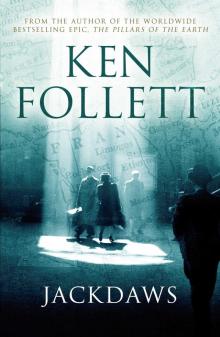 Jackdaws
Jackdaws Hornet Flight
Hornet Flight Whiteout
Whiteout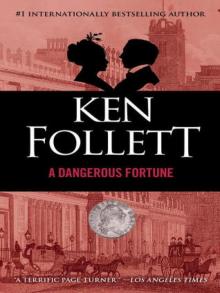 A Dangerous Fortune
A Dangerous Fortune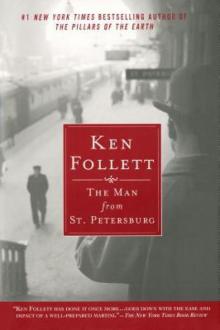 The Man From St. Petersburg
The Man From St. Petersburg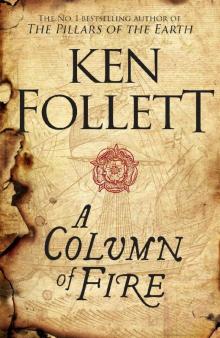 A Column of Fire
A Column of Fire The Hammer of Eden
The Hammer of Eden On Wings of Eagles
On Wings of Eagles The Evening and the Morning
The Evening and the Morning The Key to Rebecca
The Key to Rebecca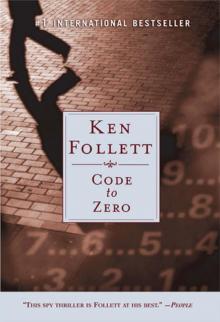 Code to Zero
Code to Zero Paper Money
Paper Money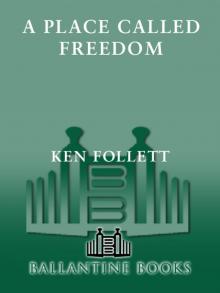 A Place Called Freedom
A Place Called Freedom The Modigliani Scandal
The Modigliani Scandal Triple (1991)
Triple (1991) A Dangerous Fortune (1994)
A Dangerous Fortune (1994) A Place Called Freedom (1995)
A Place Called Freedom (1995) Winter of the World (Century Trilogy 2)
Winter of the World (Century Trilogy 2) Code to Zero (2000)
Code to Zero (2000) On Wings Of Eagles (1990)
On Wings Of Eagles (1990) Storm Island
Storm Island Fall of Giants (The Century Trilogy)
Fall of Giants (The Century Trilogy) the Third Twin (1996)
the Third Twin (1996)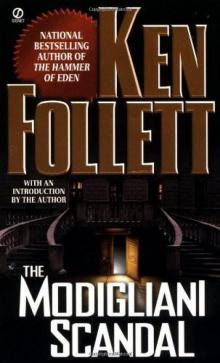 The Modigliani Scandal (1976)
The Modigliani Scandal (1976) Night Over Water
Night Over Water